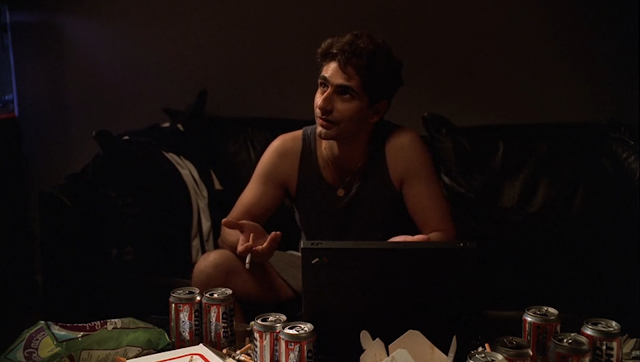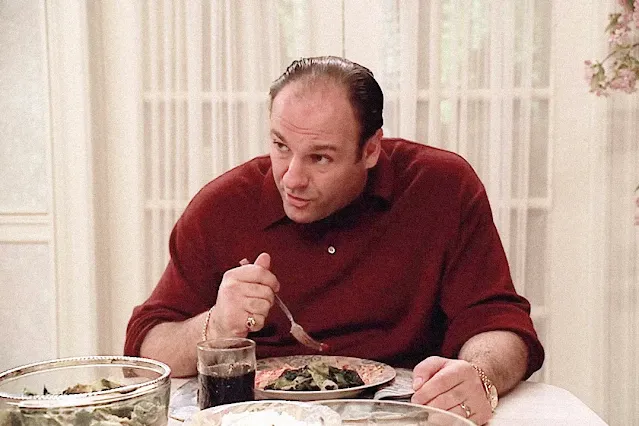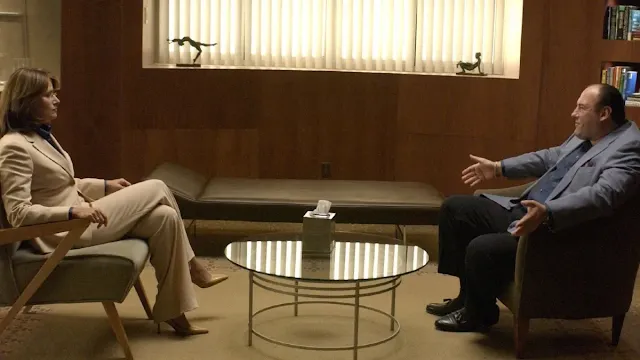“Cunnilingus and psychiatry brought us to this.”– Tony Soprano
I happened to come across The Sopranos while reading Nassim Taleb, who in a passage about the absence of pressure in modern life, equated The Sopranos with Tolstoy's War and Peace. Having read the complete War and Peace myself (though nowadays people often opt for abridged versions), and considering Taleb's discerning taste aligns closely with mine, I immediately concluded that The Sopranos must not be an ordinary series. Having just quit my job, there was no reason not to binge-watch the entire 86-episode series; I had a whole summer ahead of me for enjoyment.
I watched about 4-5 episodes per day, so the series ended quickly. I watched the final episode yesterday evening, and like many fans of The Sopranos, the ending left me feeling profoundly empty. Everyone chooses their own way of coping. Some seek out any Italian mafia-themed show they can find, while others continue with similarly acclaimed series like The Wire or Mad Men. I chose to write a review to distract myself from Satriale's pork store, the Bada Bing strip club, and Tony Soprano.
Reviewing an 86-episode series is challenging. There's so much to recount and analyze, but I'll focus on the two most notable aspects.
The Structure of the Show
If you're accustomed to watching Hollywood movies or modern entertainment, you'll find The Sopranos peculiar, even boring.
Firstly, unlike Narcos or Peaky Blinders, The Sopranos doesn't feature a lot of intense killing or gunfights. The show does have action: characters fight and kill each other continuously, but the action scenes are not glorified; they're quite close to reality. Anyone who's witnessed a real fight on the streets knows they're messy and not as glamorous as in John Wick.
Secondly, a typical show would have a logical storyline, consisting of events A leading to B, B leading to C… There's a beginning, internal struggle, climax, and clear resolution. The technique of foreshadowing is meticulously applied: a seemingly mundane detail at the beginning of a movie will help solve a problem later, delighting the audience. For example, in the opening of The Godfather, Don Corleone asks Bonasera (the undertaker) to someday help him with a favor to repay the favor that the Godfather granted him at his daughter's wedding. This seemingly trivial detail becomes significant later when Sonny is killed, and Bonasera repays the favor by preparing Sonny's body, which had been riddled with bullets.
Because of this expectation, when first watching The Sopranos, we look for foreshadowed details or anticipate an event from episode 1 to develop gradually and climax in later episodes. But David Chase, the series' creator, decided not to do so.
In The Sopranos, many details and events seem like they'll lead the audience to something bigger, but ultimately, they lead nowhere. Many people are confused when watching episodes like Employee of the Month (Dr. Melfi gets raped in the parking lot), Pine Barrens (Christopher and Paulie chase the Russian guy in the woods), or Whoever Did This (Tony kills Ralphie in the kitchen). There's no closure, and there's no life lesson or morality to draw from it all. The criminals don't repent, nor are they redeemed. Many events are left unresolved and never mentioned again, and some storylines stretch into the final season but lack closure (like Christopher's filmmaking ambitions and Tony's therapy sessions with Dr. Melfi). For those accustomed to mainstream entertainment, this lack of resolution makes watching The Sopranos feel like a waste of time: what did I learn from this? What was the director trying to say?
It wasn't until The Legend of Tennessee Moltisanti (E08S01) that I realized the invisible allure of the series: it lacks arcs and closure because The Sopranos reflects real life. In real life, not everything happens for a reason, and events in our lives rarely lead to a meaningful conclusion. Despite our search for hidden meanings, life contains no hidden messages.
In that episode, Paulie visits Christopher while he's struggling with a screenplay idea. Christopher complains that all the characters in the movie have arcs: they start somewhere, then they do something, then something happens to them, and their lives change; however, Christopher's life has no arc at all. Like most of us, Chris only exists meaninglessly. Paulie, with the wisdom of age, asserts that arcs only exist in movies. He tells Christopher that life doesn't have arcs. "I was born, I grew up, I went to the army for a few years, I did a few years in jail, and now I'm sitting here, in the mafia, that's it. Why does there have to be an arc?"
- Christopher Moltisanti:
You ever feel like nothin’ good was ever gonna happen to you?
- Paulie ‘Walnuts’ Gualtieri:
Yeah. And nothin’ did. So what? I’m alive, I’m survivin’.
- Christopher Moltisanti:
That’s it. I don’t wanna just survive. It’s says in these movie writing books that every character has an arc. Understand?
- Paulie ‘Walnuts’ Gualtieri:
[shakes head]
- Christopher Moltisanti:
Like everybody starts out somewheres. and they do something, something gets done to them and it changes their life. That’s called an arc. Where’s my arc?
Audiences seeking moral lessons or expecting a climax in the show are bound to be disappointed. The value of The Sopranos lies in providing viewers with an experience of a kind of virtual reality; the world in the show is both different and similar to the everyday world. It's akin to the feeling when playing The Sims: real life can be mundane, but life in the game isn't.
Masculinity and a Vanishing Old World
Many themes run throughout the 86 episodes of The Sopranos, such as cancer, Freud/psychological therapy, and Italian family life, but two themes I empathize with the most are masculinity and a vanishing old world.
Audiences in 2021 would be surprised by the crude language and racial/gender discrimination in The Sopranos. Tony refers to his daughter's black boyfriend as "ditsoon" (a derogatory term for black people), Christopher is afraid to introduce his African-American girlfriend to his friends, and the climax is the purge of Vito – a gang member discovered to be gay. As soon as Vito is confirmed to be a "finook" (a derogatory term for gay), he is hunted down by the Jersey gang because they believe that having a gay member in the group tarnishes the family's honor, and they can no longer show their faces to other gangs.
Audiences are shocked because, in the 21st century, these are things that are not allowed to be said. Everything we say (even everything we think) has to be "politically correct." Everyone forces themselves to talk to each other seriously and properly as if they were children speaking in front of a teacher. You can't hate gay people, you can't criticize fat/ugly people, you can't discriminate against black people... Movies even refrain from letting actors swear. I heard that for each season of Breaking Bad – a crime drama – authorities only allowed the use of the word "fuck" once. When watching The Sopranos, audiences witness an old world full of freedom, a world not bound by politically correct standards: people are free to think, speak, and act according to their own values without fear of criticism. Throughout the series, the most not-politically correct theme is perhaps the emphasis on masculinity.
Nowadays, the term masculinity is rarely standing alone. "Masculinity" often comes with "toxic" (toxic masculinity). The modern world has been so feminized that openly being a man is considered a sin. The ideology of feminism and gender equality seems to want to blur the lines between women and men. In large urban areas, men are gradually losing their toughness in both inner and outer aspects. Since ancient times, this has been seen as the biggest criterion distinguishing between the two genders. In classical standards, strength is the hallmark of a man. When I was studying Latin, I read Julius Caesar's De Bello Gallico (The Gallic Wars). In the very first chapter, Caesar makes the following observation:
Of all these, the Belgae are the bravest, because they are furthest from the civilization and refinement of [our] Province, and merchants least frequently resort to them, and import those things which tend to effeminate the mind;
The model of manhood in The Sopranos is very traditional and rugged: men must have strong bodies, they must not show weakness in their soul, they must not complain in the face of difficulties but instead, dive into action. Men must be like Gary Cooper.
“What happened to Gary Cooper? The strong, silent type. That was an American. He wasn’t in touch with his feelings. He just did what he had to do.”Masculinity is highly regarded by the characters in the show on par with their own lives. They believe that men must not show weakness, contrary to today's perspective that men also have the right to cry and express emotions. This theme is depicted through many significant scenes.
– Tony Soprano
In the early episodes, Tony secretly goes to see a psychiatrist because he's afraid of being looked down upon, and indeed, when the matter is revealed, the entire gang mocks Tony for a man visiting a female doctor to talk about family issues. In the final season, after Tony gets shot, people start to assess Tony as a weak boss (due to his declining physical condition). Tony has to salvage his image by engaging in a fistfight with his own bodyguard even though his wound hasn't fully healed. In another episode, Johnny Sacrimoni, the leader of the New York gang, despite being in prison, still doesn't forget to maintain a strong image: he refuses to wear glasses during his trial because he believes wearing glasses in court makes him look weak. When handcuffed at his daughter's wedding, Johnny gets emotional and starts crying, immediately earning disdain from all the gangsters. Phil, Johnny's replacement as boss, declares that he no longer considers Johnny a man if he cries. Everyone agrees with Phil.
Today, you couldn't say things like that on screen. Masculinity has almost become a taboo subject and is vehemently criticized online. The Sopranos shows modern audiences how much the image of strong men was once valued. This world of masculinity is gradually fading and shrinking: the old generation is dying out while the new generation doesn't want to continue the old traditions (Tony's and Vito's sons are both effeminate young men). As the show progresses into the modern world (the early 2000s), there's a moment when Rosalie remarks to Carmela (Tony's wife) "These men are still living in the last century."
Towards the end of the show, we see Tony's and Phil's gangs as the last warriors still preserving their way of life and traditional values. Their old world is slowly being swallowed up by the modern world, and whether you support those values or not, audiences still feel sad witnessing their demise. In the episode Johnny Cakes, Patsy goes to collect protection money at a Starbucks-style coffee chain. After hearing the young manager explain that every penny is managed through computers and that these large corporations don't pay taxes to the mob, Patsy is forced to leave, defeated by a type of business they've never seen before.
Besides these two main points, I also love The Sopranos for its rewatchability. With movies based on suspense/mystery (like detective films), it's hard to watch them again because you already know who the culprit is. The Sopranos focuses on character development so you can watch it over and over again without getting bored.
Additionally, because the show is so famous, there are countless analyses/reviews online (some websites analyze the meaning of every small detail in each episode). This makes The Sopranos richer in meaning and more interesting to watch.
I hope my short review also helps to add a little more meaning to The Sopranos and makes viewers more interested in watching the show.
Read more: Anton Chigurh: A Monster for the Ages





One of the best crime series I've ever watched, if not the best. Italian criminals are something else; of course, crime is still crime, but Italian men have a unique Mediterranean masculinity.
ReplyDelete<3
Delete